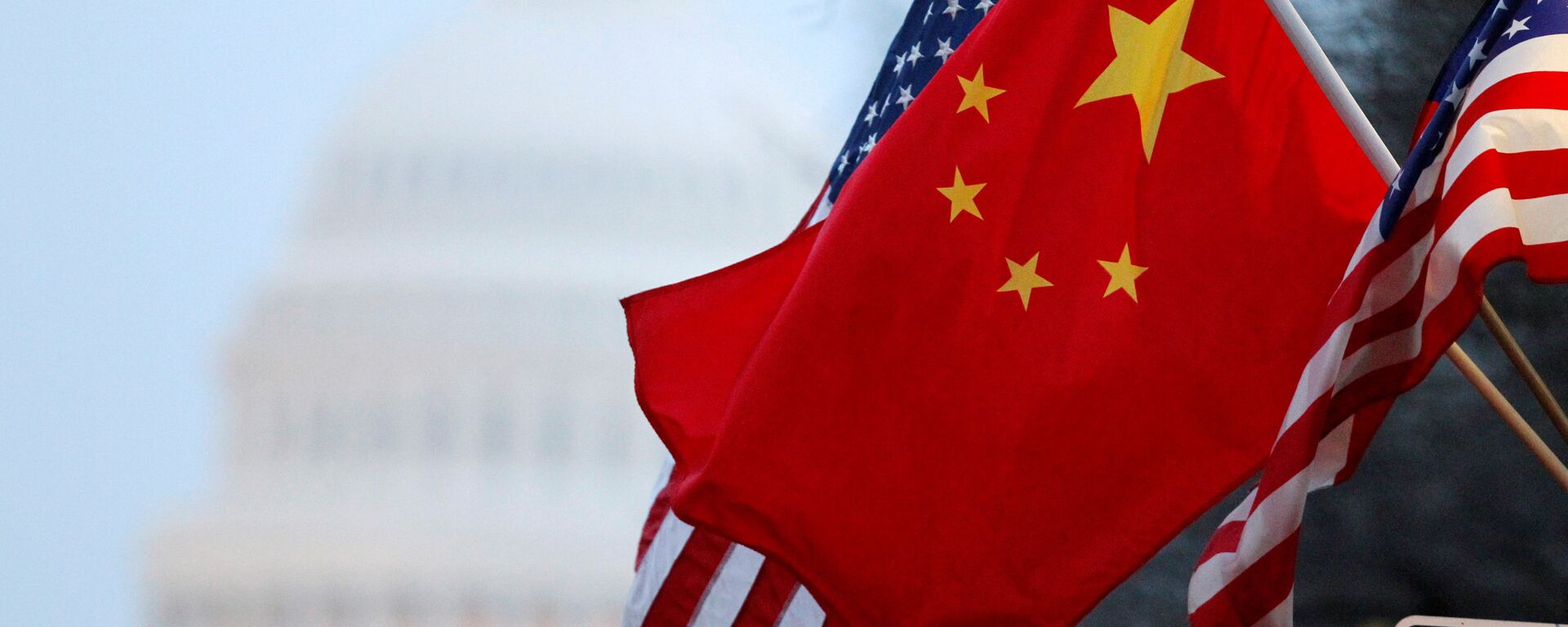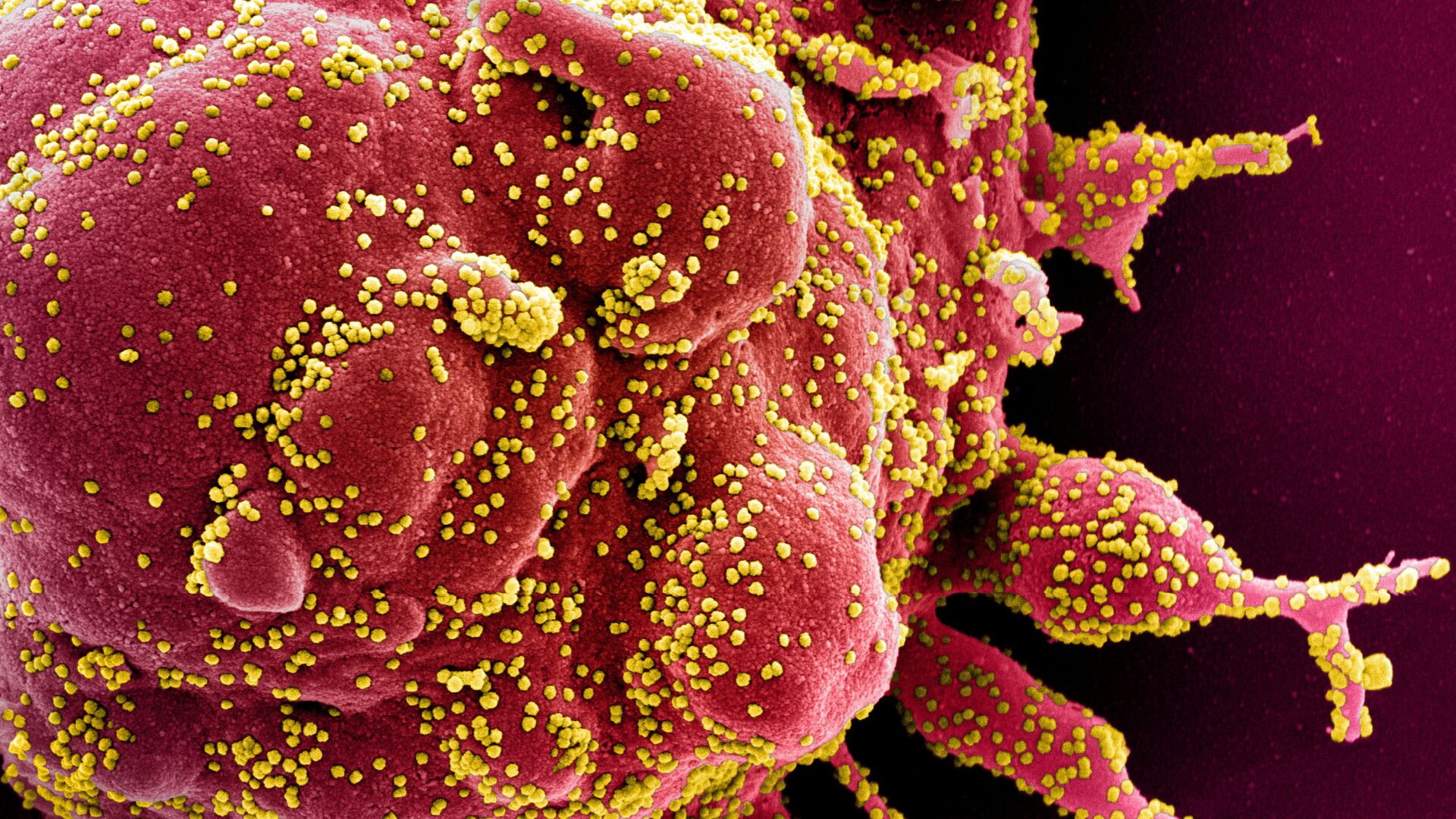https://sputnikglobe.com/20210907/us-funded-american-company-reportedly-researched-coronaviruses-in-chinese-wuhan-lab-since-2014-1088860101.html
US-Funded American Company Reportedly Researched Coronaviruses in Chinese Wuhan Lab Since 2014
US-Funded American Company Reportedly Researched Coronaviruses in Chinese Wuhan Lab Since 2014
Sputnik International
US-Funded American Company Reportedly Researched Coronaviruses in Chinese Wuhan Lab Since 2014
2021-09-07T19:35+0000
2021-09-07T19:35+0000
2022-08-06T13:23+0000
china
coronavirus
wuhan
2020 coronavirus outbreak
covid-19
us
https://cdn1.img.sputnikglobe.com/img/07e5/06/1d/1083264831_0:355:2383:1695_1920x0_80_0_0_1756d8e22179baca0b180f1aab8a9ed8.jpg
The American EcoHealth Alliance health organization received several million dollars in financing beginning in 2014 from the US government to conduct research on pathogens, including coronaviruses, looking for the possibility of them jumping to humans from animals, The Intercept reported citing documents obtained via a Freedom of Information Act request. The company was funded by the National Institute of Allergy and Infectious Diseases with one of the programmes lasting from 2014 to April 2020 and another continuing even now.According to some 900 pages of obtained documents analysed by experts and activists for The Intercept, EcoHealth Alliance studied coronaviruses found in bats using the level 3 lab at Wuhan University Center for Animal Experiment - not the Wuhan Institute of Virology, as many conspiracy theory supporters and some US government officials believed. The grant for this research was reportedly called "Understanding the Risk of Bat Coronavirus Emergence" and studied not only viruses found naturally in cave bats, but also in those said to be genetically engineered.While EcoHealth Alliance Director Peter Daszak rejected the lab leak theory, The Intercept claims that company documents raise concerns that such research could have led to an outbreak and the current pandemic. According to the media outlet, some $599,000 was used by the US company to fund efforts to identify and alter, allegedly to infect human-like cells, in the Wuhan Institute of Virology.Richard Ebright, a molecular biologist at Rutgers University, told the outlet that the documents contain data about research into lab-made viruses, which were created to be able to infect lab mice engineered to mimic the human organism. According to Ebright, researchers created at least two different types of coronaviruses that successfully infected "humanized mice".Another molecular biologist, Alina Chan from the Broad Institute, said the documents also show that the EcoHealth Alliance knew about the risks of working with coronaviruses. They namely were concerned with field scientists in close contact with coronavirus-infected bats and the by-products of their activities, as well as being bitten, the biologist noted. Chan said the company even registered cases of bites, but it is unclear from the documents if records were kept.Bats are one of the primary suspects for being the source of COVID-19. The disease, which struck the entire planet and infected hundreds of millions, is genetically similar to viruses found in these mammals. The EcoHealth Alliance played down the importance of findings with its communications manager, Robert Kessler, saying that the company simply applied for grants to conduct research which the US agency found to be important.Following the first research, funding for which was suspended in April 2020 by the Trump administration, a new one was reportedly launched in August 2020 and is called "Understanding Risk of Zoonotic Virus Emergence in Emerging Infectious Disease Hotspots of Southeast Asia". This time it aims at scaling up and deploying resources in the Asian region in case of an outbreak of a novel infectious disease, the media outlet says, citing documents.The findings by The Intercept follow the publication of a report ordered by US President Joe Biden by US intelligence agencies into the origins of COVID-19. POTUS announced on 27 August that the findings of spy agencies were inconclusive: while the majority ruled the "Chinese lab leak" theory of the coronavirus emergence as "unlikely", some suggested that it cannot be ruled out. Beijing repeatedly rejected the notion that one of its laboratories that is routinely working with coronaviruses mistakenly engineered and/or unintentionally released the deadly pathogen into the wild.
https://sputnikglobe.com/20210828/china-blasts-us-intel-report-on-covid-19-origins-says-its-not-scientifically-credible-1083736533.html
china
wuhan
Sputnik International
feedback@sputniknews.com
+74956456601
MIA „Rossiya Segodnya“
2021
Tim Korso
https://cdn1.img.sputnikglobe.com/img/07e6/03/0d/1093831826_0:0:216:216_100x100_80_0_0_e3f43a960af0c6c99f7eb8ccbf5f812c.jpg
Tim Korso
https://cdn1.img.sputnikglobe.com/img/07e6/03/0d/1093831826_0:0:216:216_100x100_80_0_0_e3f43a960af0c6c99f7eb8ccbf5f812c.jpg
News
en_EN
Sputnik International
feedback@sputniknews.com
+74956456601
MIA „Rossiya Segodnya“
Sputnik International
feedback@sputniknews.com
+74956456601
MIA „Rossiya Segodnya“
Tim Korso
https://cdn1.img.sputnikglobe.com/img/07e6/03/0d/1093831826_0:0:216:216_100x100_80_0_0_e3f43a960af0c6c99f7eb8ccbf5f812c.jpg
us researched coronaviruses
us researched coronaviruses
US-Funded American Company Reportedly Researched Coronaviruses in Chinese Wuhan Lab Since 2014
19:35 GMT 07.09.2021 (Updated: 13:23 GMT 06.08.2022) The report comes in the wake of US intelligence agencies releasing an inconclusive report on the origins of COVID-19. While most ruled out a lab leak, some believed the possibility cannot be completely excluded.
The American EcoHealth Alliance health organization received several million dollars in financing beginning in 2014 from the US government to conduct
research on pathogens, including coronaviruses, looking for the possibility of them jumping to humans from animals, The Intercept reported citing documents obtained via a Freedom of Information Act request. The company was funded by the National Institute of Allergy and Infectious Diseases with one of the programmes lasting from 2014 to April 2020 and another continuing even now.
According to some 900 pages of obtained documents analysed by experts and activists for The Intercept, EcoHealth Alliance studied coronaviruses found in bats using the level 3 lab at Wuhan University Center for Animal Experiment - not the Wuhan Institute of Virology, as many conspiracy theory supporters and some US government officials believed. The grant for this research was reportedly called "Understanding the Risk of Bat Coronavirus Emergence" and studied not only viruses found naturally in cave bats, but also in those said to be genetically engineered.
"[These documents are] a road map to the high-risk research that could have led to the current pandemic".
Gary Ruskin
Executive director of US Right To Know group investigating the origins of Covid-19
While EcoHealth Alliance Director Peter Daszak rejected the lab leak theory, The Intercept claims that company documents raise concerns that such research
could have led to an outbreak and the current pandemic. According to the media outlet, some $599,000 was used by the US company to fund efforts to identify and alter, allegedly to infect human-like cells, in the Wuhan Institute of Virology.
Richard Ebright, a molecular biologist at Rutgers University, told the outlet that the documents contain data about research into lab-made viruses, which were created to be able to infect lab mice engineered to mimic the human organism. According to Ebright, researchers created at least two different types of coronaviruses that successfully infected "humanized mice".
"The viruses they constructed were tested for their ability to infect mice that were engineered to display human type receptors on their cell. While they were working on SARS-related coronavirus, they were carrying out a parallel project at the same time on MERS-related coronavirus [which causes Middle East Respiratory Syndrome]".
Richard Ebright
Molecular biologist at Rutgers University
Another molecular biologist, Alina Chan from the Broad Institute, said the documents also show that the EcoHealth Alliance knew about the risks of working with coronaviruses. They namely were concerned with field scientists in close contact with coronavirus-infected bats and the by-products of their activities, as well as being bitten, the biologist noted. Chan said the company even registered cases of bites, but it is unclear from the documents if records were kept.
Bats are one of the primary suspects for
being the source of COVID-19. The disease, which struck the entire planet and infected hundreds of millions, is genetically similar to viruses found in these mammals. The EcoHealth Alliance played down the importance of findings with its communications manager, Robert Kessler, saying that the company simply applied for grants to conduct research which the US agency found to be important.

28 August 2021, 03:36 GMT
Following the first research, funding for which was suspended in April 2020 by the Trump administration, a new one was reportedly launched in August 2020 and is called "Understanding Risk of Zoonotic Virus Emergence in Emerging Infectious Disease Hotspots of Southeast Asia". This time it aims at scaling up and deploying resources in the Asian region in case of an outbreak of a novel infectious disease, the media outlet says, citing documents.
The findings by The Intercept follow the publication of a report ordered by US President Joe Biden
by US intelligence agencies into the origins of COVID-19. POTUS announced on 27 August that the findings of spy agencies were inconclusive: while the majority ruled the "Chinese lab leak" theory of the coronavirus emergence as "unlikely", some suggested that it cannot be ruled out. Beijing repeatedly rejected the notion that one of its laboratories that is routinely working with coronaviruses mistakenly engineered and/or unintentionally released the deadly pathogen into the wild.



